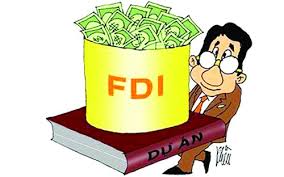In this blog post, Angela D’souza, a student pursuing her LL.B (4th year) from School of Law, Christ University, Bangalore and a Diploma in Entrepreneurship Administration and Business Laws from NUJS, Kolkata, elaborates on the FDI Policy on E-commerce in India.
What is Meant by FDI?
Investment in a country by individuals and organisations from other countries forms an integral part of international finance. Such investment can be made in the form of portfolio investments (acquisition of securities) or direct investment (creation of productive facilities).[1]
Foreign Direct Investment is the outcome of the mutual interests of multinational firms and host countries. According to the International Monetary Fund, FDI is defined as
‘…an investment that is made to acquire a lasting interest in an enterprise operating in an economy other than that of the investor. The investor’s purpose being to have an effective voice in the management of the enterprise.’[2]
Why is FDI better than other forms of capital inflows?
FDI is considered to be better than other forms of capital inflows for various reasons:
- In comparison to foreign lenders and portfolio investors, foreign direct investors usually have a long-term outlook while investing in the host country. Therefore, capital inflows by way of FDI are more consistent than another form of capital informs.
- While debt inflows may finance consumption rather than investment in the host country, FDI is more likely to be used productively.[3]
- It is expected that FDI will have a greater impact on economic growth as it provides for more than just capital. It opens the gateway to access internationally available technology and managerial know-how that makes it easier to penetrate global markets.
Although FDI is primarily undertaken for private gain it can have many favourable effects on the host country especially in cases of less developed countries:
- Raising the level of investment: Foreign investment can fill the gap between desired investment and locally mobilised savings.[4]
- Upgradation of technology: Foreign investments opens the way for inroads of new technology and managerial know-how.
 Production units in developing nations usually utilise outdated equipment and techniques that reduce the productivity of workers substantially leading to the production of low-quality goods. As a consequence, the ability of domestic producers to compete with foreign producers is also reduced. FDI easily solves this problem through the embodiment of advanced technology as an investment.
Production units in developing nations usually utilise outdated equipment and techniques that reduce the productivity of workers substantially leading to the production of low-quality goods. As a consequence, the ability of domestic producers to compete with foreign producers is also reduced. FDI easily solves this problem through the embodiment of advanced technology as an investment.
- Improvement in Export Competitiveness: FDI can aid in increasing the export competitiveness of the host nation. By raising the level of efficiency and the standards of product quality, FDI makes a positive impact on the export performance of the host nation.
- Employment generation: FDI inflows results in the setting up of new industries and manufacturing units which contribute to the formation of human capital formation in the new country.
- Benefits to consumers: New products and services under the aegis of Foreign Direct Investment benefits consumers through better goods at competitive prices.
- Resilience in the case of economic crisis: FDI has known to be resilient during the financial crisis. For example, in East Asian nations, FDI investments were remarkably stable during the global financial crisis of 1997-98.[5] In comparison, other forms of investment such as portfolio equity and debt flows saw a huge reversal during the same time.
- Revenue to the Government: Profits generated through FDI contribute to corporate tax revenues in the host countries.[6]
Drawbacks of Foreign Direct Investment
Though FDI proves to be a blessing to host nation, it is not free of its own set of drawbacks. The adverse effects of Foreign Direct investment can be summed up as follows:
- When foreign investment is competitive with home investment, profits in domestic industries fall leading to a drop in domestic savings.[7]
- The contribution of foreign firms by way of corporate tax is comparatively less due to the tax concessions, investment allowances and subsidies granted by the host nation.
Foreign Direct Investment In E-Commerce
The Central Government recently permitted 100 percent FDI in the E-Commerce sector. However, this was applicable to only to e-commerce marketplaces while FDI in B2C e-commerce has been disallowed in India.
In order to understand what it exactly means and the repercussions of such a decision, it is essential to understand as to what is meant by e-commerce.
What is E-Commerce? What does it entail?
The Department of Industrial Policy and Promotion (during the recent declaration of 100 percent FDI in the e-commerce sector) defines e-commerce as the buying and selling of goods and services including digital products over the digital and electronic network.[8] Now e-commerce is of two types:
Marketplace based model of e-commerce: Providing of an information technology platform by an e-commerce entity on a digital ad electronic entity which can act as a facilitator between buyer and seller.[9]
Inventory based model of e-commerce: An e-commerce activity where the inventory of goods and services is owned by e-commerce entity and sold directly to consumers. FDI is not permitted in the inventory based model of e-commerce.[10]
Now there are certain conditions under which a Foreign Direct Investment can be allowed in the B2C E-Commerce Sector:
- A manufacturer is permitted to sell its products manufactured in India through e-commerce retail.
- A single brand retail entity is operating through brick and mortar stores, is permitted to undertake retail trade through e-commerce.
- An Indian manufacturer would be the investee company where it is the owner of the Indian brand. The rules also add that the manufacturer must create 70% of the goods in-house and 30% may be sourced from Indian manufacturers.
In addition to this, an e-commerce entity is not permitted to derive more than 25% of the sales affected through its marketplace from one vendor or their group companies.
Further, the Government has put a rider that e-commerce marketplace cannot, directly or indirectly, influence the selling price of products. This essentially means companies will not be able to offer huge discounts to consumers anymore, which had become the unique selling proposition for all online retailers.[11]
What does prohibition of FDI in B2C form of E-Commerce mean?
It essentially a means that FDI is disallowed in actual e-commerce, that which allows online retailers to own inventory and hence the consumer experience from start to finish. It also prevents smaller online retailers from raising FDI and leaves them beholden to marketplaces for scale.
Why is FDI discouraged in B2C form of E-Commerce?
There are several reasons for the same:
- The nature of e-commerce business is such that it cannot be restricted to a particular geographical area. Since FDI is under the control of the state governments, laws vary from state to state and as a consequence application becomes difficult.
- Different VAT rates exercised in different states and union territories makes it more complex.
- The threat of a monopoly by MNCs and the survival of Indian MSMEs will be a larger concern in that scenario.
References:
[1] Niti Bhasin & , External Sector Reforms in India 1991-2005 (New Century Publications 2005), 198.
[2] Maitena Duce & Banco de España, Definitions of Foreign Direct Investment (FDI): A Methodological Note, 2003 (2003), 2.
[3] Supra note 1 at 199.
[4] Id at 202.
[5] Id at 204.
[6] Id at 205.
[7] Id.
[8] http://www.medianama.com/2016/03/223-dipp-defines-what-ecommerce/ (last accessed on September 30, 2016)
[9] Id.
[10] Id.
[11] http://www.vccircle.com/news/technology/2016/03/29/india-formally-allows-fdi-e-commerce-marketplace-stumps-clause (last accessed on: September 30, 2016).
 Serato DJ Crack 2025Serato DJ PRO Crack
Serato DJ Crack 2025Serato DJ PRO Crack










 Allow notifications
Allow notifications


